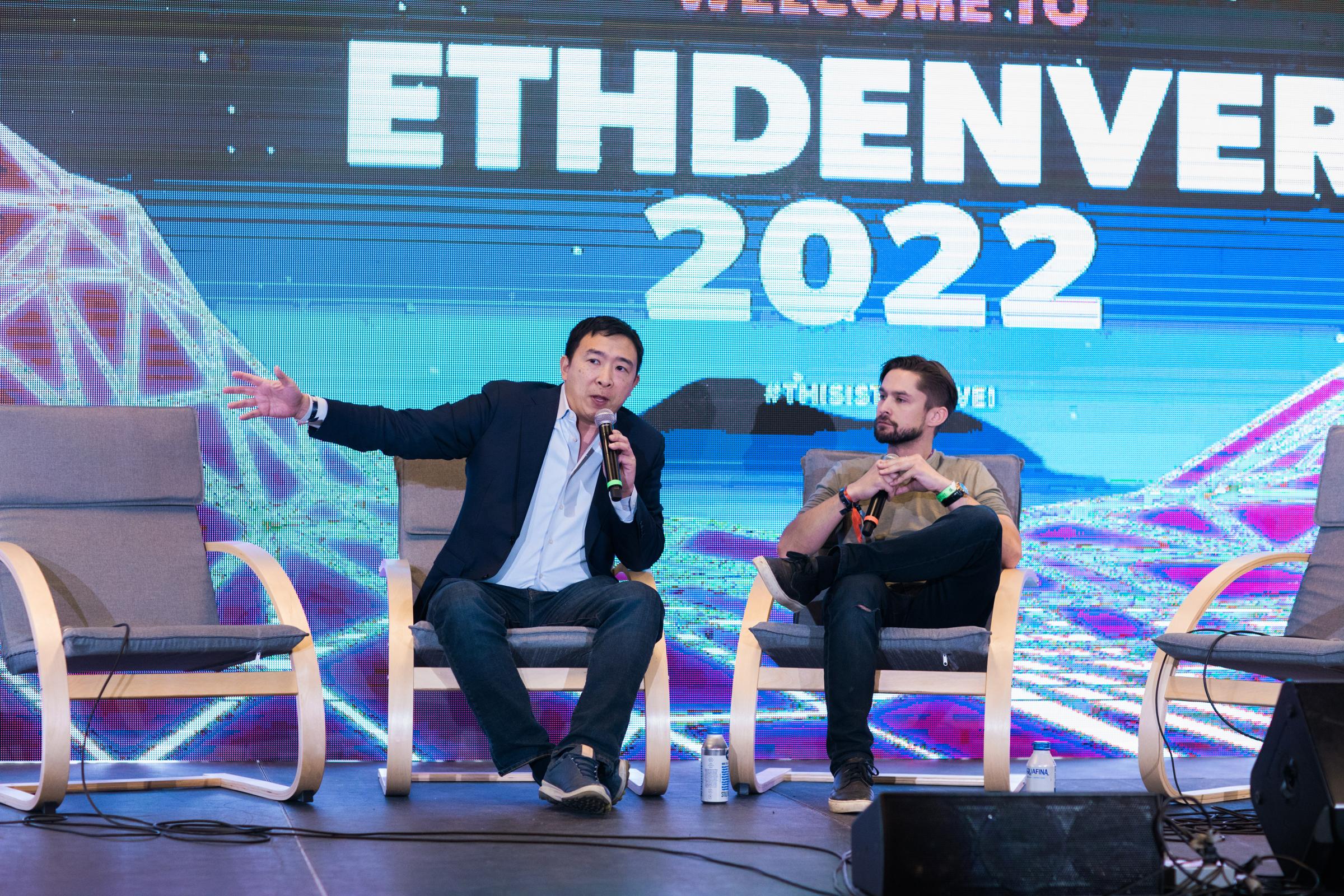
A version of this article was published in TIME’s newsletter Into the Metaverse. Subscribe for a weekly guide to the future of the Internet. You can find past issues of the newsletter here.
Last week, I was one of the more than 8,000 attendees of ETHDenver 2022, a cryptocurrency conference that sprawled over a week and across several city blocks of Denver, Colo. Compared with other crypto-centric events like Art Basel or Bitcoin Miami, ETHDenver has a larger technical bent, with hackers coming from around the world to build projects on the Ethereum blockchain. But the conference was also full of venture capitalists, speculators, politicians, EDM enthusiasts—and unfortunately, COVID-19. Here’s what I saw during my week in Denver.
A COVID-19 Outbreak
When I boarded a plane out of Denver on Monday, I started feeling a tickle in my throat. I woke up the next morning feeling like I had been run over by a truck: nausea, chills, fever, cough, general fatigue. Two antigen tests told me what I already essentially knew: that I was positive for COVID-19. A quick search on Twitter told me I was far from the only one:
In hindsight, none of this is surprising. Thousands of people from around the world descended up on a few indoor spaces—most centrally, a ratty six-story former Sports Authority known as the Sports Castle, whose bathrooms stopped working halfway through the conference—and proceeded to talk loudly in each other’s faces for hours on end. People wearing masks were few and far between, and social distancing was nonexistent. While everyone was required to take a rapid test before entering the conference on their first day, vaccinations weren’t required, and participants had plenty of chances to contract the virus at numerous indoor nighttime parties staged across the city.
Attendees joked that ETHDenver 2020 had been one of COVID-19’s initial superspreader events. The 2022 edition was a reminder that the pandemic is still fully in swing, no matter how much people want to put it behind them. I would recommend everyone who went to the conference to get tested immediately.
A Panel Hosted By Yours Truly
On Saturday afternoon, before I felt any symptoms, I hosted a panel at the castle’s mainstage entitled “Is Blockchain the Future of Technology?” The four panelists were powerhouses leading major blockchain projects: Illia Polosukhin, a co-founder of the blockchain NEAR; Sam Kazemian, the founder of the stablecoin Frax; Ric Burton, the CEO at Balance Software; and Eva Beylin, the director of blockchain data company the Graph Foundation.
You can watch the whole thing below. We talked about the differences between Silicon Valley and crypto companies and why crypto companies have so many ex-techies; and the aspects of blockchain technology they’re most excited about, including the use of machine learning toward creating a safer and more secure user experience. Asked for their thoughts on the metaverse, here’s how three of the panelists responded:
Eva Beylin: “When it comes to the metaverse, the infrastructure of the metaverse needs to be decentralized. When companies like Meta come out, it’s unclear if they’re achieving the vision or just rebranding. More creatively, what the metaverse enables is for us to have a digital afterlife. While Instagram, Twitter, and other web 2 social media captures our thoughts and images, they’re stored on centralized servers. But when you think about afterlife—your legend or what lives on after you’re gone—the metaverse, given everything is permanent on chain and people can interact with it, kind of enables all of us to live on beyond our physical body.”
Ric Burton: “F-ck the metaverse. Let’s get people paid. Let’s get them so they don’t have to worry about next month’s rent. Let’s get them building cool sh-t and having fun and looking people in the eye and falling in love and going to a forest. F-ck putting goggles on your eyes.”
Illia Polosukhin: “We are living in the metaverse already. Every single person here has a phone which has most of their life in that device, somewhere in the cloud, shared with all the other people in this ecosystem. For me, the definition being in the metaverse is where more than 50% of your assets, of your communications, of your friendships, are digital. And we are there already. 3D glasses and VR don’t really matter as much as the connections we build and the things we do in this very rich environment.”
Politicians Come to Crypto
Cryptocurrency’s influence is growing in Washington, as evidenced by the recent congressional hearings and the rising number of congressional candidates putting crypto at the center of their platforms. At ETHDenver, politicians came onto crypto’s turf, most notably Colorado Governor Jared Polis and former presidential candidate Andrew Yang.
Gov. Polis, a democrat, has long been a proponent of cryptocurrency, including co-founding the Blockchain Caucus when he was a house representative in 2016. At a keynote speech on the main stage, he announced that Colorado would accept state taxes and fees in cryptocurrency by this summer. “We see the blockchain as a critical part of Colorado’s overall innovation ecosystem,” he said. “When it comes to privacy and information, one of the main parties says, ‘trust corporations,’ while the other says, ‘trust the government.’ Most don’t trust either. That’s what the blockchain allows us to solve for: It can disintermediate both corporations and the government.”
Yang was a surprise entry to the conference. He spent Saturday floating around and taking pictures with fans. (“I’m a republican, but I love you,” one conference goer told him before asking for a photo.”) Yang declined an interview with TIME, before later declaring onstage that “Web3 could be the biggest anti-poverty initiative in the history of the world.”

Hackathon Projects
Every floor of the Sports Castle featured rows of tables and beanbags filled with coders, who spent the weekend furiously creating new blockchain-based projects. Over 170 teams competed for a total of $1 million in bounties and prize money and $2 million in investment capital. Of those, 5 final winners were selected, including DustSweeper, which attempts to mitigate the soaring transaction fees on Ethereum for users sending small amounts of value; Loudverse, a marketplace for public goods like music, poetry, and theater; and Proof of Meditation, which rewards users with tokens for keeping up with a meditation cycle.
The Ethereum Foundation, which works to improve the underlying infrastructure of the Ethereum blockchain, also announced a breakthrough towards making the network cheaper and faster.
Vitalik Takes Centerstage
The conference’s main man was Vitalik Buterin, the 28-year-old founder of Ethereum who has become something of crypto’s central philosopher over the past decade. Buterin, who gave two talks, has a discursive and often highly theoretical talking style, making it difficult to pull out specific and succinct theses from his speeches. In the first one, he talked about how while blockchain tends to rely heavily on theory, its builders should also rely on more empirical processes in developing out its platforms.
In the second talk, entitled “Steps to the Digital State,” he talked about how crypto experiments in governance, like city tokens and City DAO, should start small before building up. He also addressed the environmental critiques many have about the blockchain space, calling the concerns “fair.” But he said that Ethereum’s switch from Proof of Work to Proof of Stake—a process that theoretically keeps the blockchain running and secure—would drastically reduce the blockchain’s environmental impact. He suggested that any companies worried about negatively impacting the environment delay any partnership with Ethereum until a week after the switch. “If the merge gets delayed until 2025, then you’re not going to do it until 2025,” he says. “So you’re not contributing to the environmental challenge: In fact, you’re contributing to the motivation for this community to keep up the good work and get the thing over the finish line.”
More Must-Reads from TIME
- Cybersecurity Experts Are Sounding the Alarm on DOGE
- Meet the 2025 Women of the Year
- The Harsh Truth About Disability Inclusion
- Why Do More Young Adults Have Cancer?
- Colman Domingo Leads With Radical Love
- How to Get Better at Doing Things Alone
- Michelle Zauner Stares Down the Darkness
Contact us at letters@time.com



